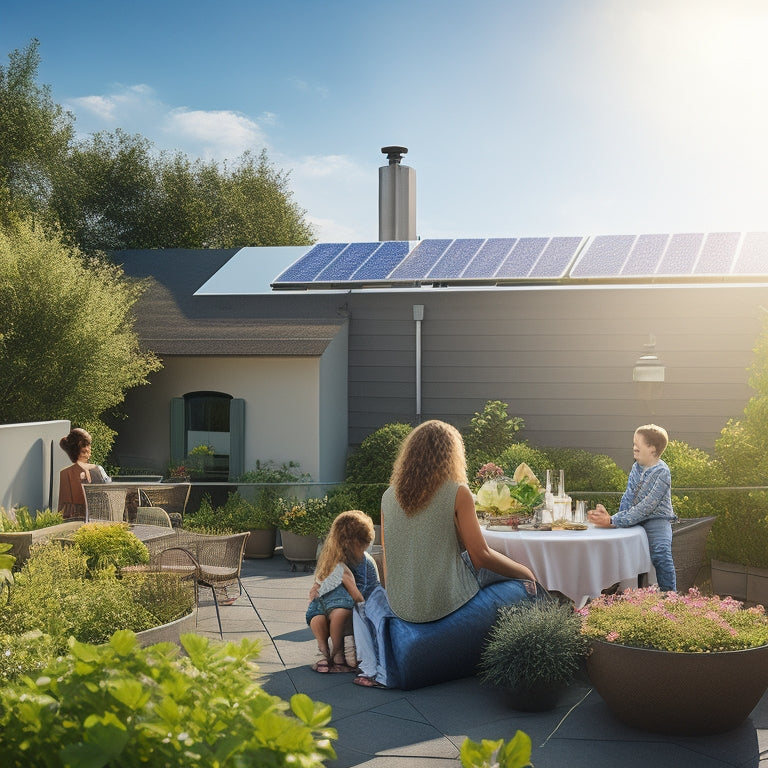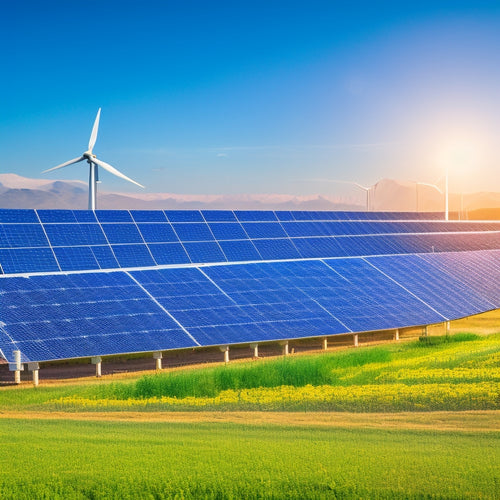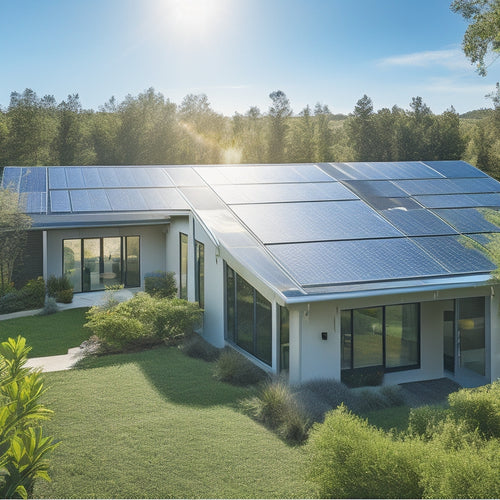
Top 10 Cost-Effective Solar Panels for Your Home
Share
Choosing cost-effective solar panels for your home is vital for maximizing savings and enhancing property value. Look for panels with efficiency ratings above 18%, as they provide better energy output and lower long-term bills. Consider warranties lasting 25 years or more, reflecting the manufacturer's confidence in durability. Several brands offer financing options and incentives, making quality solar solutions accessible. Think about your energy needs and compare wattage ratings to guarantee peak performance. Exploring the best options available can improve your financial flexibility while promoting energy independence. You'll find efficient choices that align with your budget and goals.
At a Glance
- Look for solar panels with high efficiency ratings above 20% for greater energy output and long-term savings.
- Consider the total installation costs and available government incentives to maximize your budget.
- Research warranty options; opt for panels with a minimum 25-year warranty for performance and defect coverage.
- Evaluate durability and longevity; high-quality materials like monocrystalline silicon enhance efficiency and lifespan.
- Compare wattage ratings and energy output to ensure optimal performance and energy independence for your home.
Lower Long-Term Energy Costs
Investing in solar panels greatly reduces your electricity bills, allowing you to save money over time.
As you generate your own energy, you'll notice a direct impact on your monthly expenses, leading to a healthier budget.
With potential savings of up to 50% or more and the support of government incentives, the shift to solar power becomes even more financially attractive.
Additionally, the installation of solar panels can increase your home's value, making it a smart financial decision for the future.
Reduced Electricity Bills
As energy costs climb, opting for solar panels can greatly lower your electricity bills over time. By utilizing the sun's energy, you create a sustainable electricity source that reduces your reliance on grid power. This change not only cuts direct costs but also shields you from unpredictable energy price hikes.
Initially, you might worry about installation costs, but consider the long-term savings. Many areas offer government incentives, such as tax credits and rebates, which can considerably offset initial expenses. These incentives make solar energy more accessible, allowing you to invest in your freedom from rising utility rates.
Once installed, solar panels require minimal maintenance, and the energy generated can cover a large portion—if not all—of your electricity needs. This shift to renewable energy means you'll enjoy consistent, lower bills month after month, freeing up finances for other priorities.
Moreover, as energy prices continue to skyrocket, your solar investment will increasingly pay off. You're not just saving money; you're also taking control of your energy future, creating a more sustainable lifestyle while safeguarding your budget from external fluctuations.
Increased Home Value
Homeowners often experience a significant increase in property value when they install solar panels, thanks to the lower long-term energy costs that come with renewable energy. This enhancement in property value aligns with current home market trends, where energy efficiency is a top priority for buyers.
Investing in solar panels not only reduces your electricity bills but also makes your home more appealing in a competitive market.
Studies show that homes equipped with solar energy systems have a higher resale value compared to those without. In fact, prospective buyers are often willing to pay a premium for homes that promise lower energy costs and sustainability.
This means that by opting for solar panels, you're not just saving money; you're also making a smart investment in your home's future.
As energy prices continue to rise, the appeal of solar energy becomes even more pronounced. You'll enjoy the benefits of reduced utility bills today while positioning your property as a desirable asset tomorrow.
Embracing solar energy can enhance your home's resale value and give you the freedom to invest in other opportunities. Essentially, solar panels are a win-win for both your wallet and your property.
Increased Home Value
Installing solar panels not only enhances your home's energy efficiency but also increases its market value considerably.
Buyers are increasingly looking for homes with sustainable features, making your investment a savvy choice in the long run.
Energy Efficiency Benefits
Investing in cost-effective solar panels not only reduces your energy bills but also greatly improves your home's value. By integrating sustainable energy solutions, you're not just enhancing your living space; you're also making a strategic investment in your property.
Homes equipped with solar panels often see a significant increase in market appeal, as potential buyers are increasingly prioritizing energy efficiency.
Moreover, the environmental impact of switching to solar energy can't be overstated. Reducing reliance on fossil fuels contributes to a healthier planet, and buyers are drawn to homes that align with these values. They recognize that solar panels signify lower utility costs and a commitment to sustainability, making your property more attractive in a competitive market.
As energy prices continue to rise, homes with solar installations stand out. With each kilowatt generated, your energy independence grows, which is a powerful selling point.
Therefore, by choosing cost-effective solar panels, you're not only enhancing your immediate living conditions but also securing your home's long-term value. Accept the freedom that comes with sustainable energy and watch your investment flourish.
Long-Term Investment Value
When considering the long-term investment value of solar panels, it's clear they can greatly enhance your property's worth. As energy costs continue to rise, prospective buyers increasingly recognize the appeal of homes equipped with renewable energy solutions. By investing in solar panels, you're not just reducing your monthly utility bills; you're also positioning your home favorably in a competitive real estate market.
Before installation, consider various factors such as the orientation of your roof, potential shading, and local regulations. These installation considerations can impact both performance and return on investment.
Additionally, investigate financing options that align with your financial strategy. Many homeowners find attractive incentives and low-interest loans that make solar panel installation more accessible.
Ultimately, a well-planned solar investment can yield significant returns, both in energy savings and increased home value. In fact, studies show that homes with solar energy systems sell for more than those without.
Key Specifications Overview
When selecting solar panels for your home, understanding efficiency ratings and warranty details is essential.
These specifications not only impact your energy savings but also determine the long-term reliability of your investment.
Additionally, considering factors such as installation costs and government incentives can greatly influence your overall budget and return on investment.
Be sure to investigate government incentives that can help offset installation costs.
Let's break down what these key factors mean for your solar energy system.
Efficiency Ratings Explained
Understanding efficiency ratings is essential for selecting the right solar panels for your home. These ratings indicate how effectively a solar panel converts sunlight into electricity, which is critical for maximizing your energy independence and savings.
Here's a quick overview of common efficiency measurement methods and their implications on solar panel technologies:
| Efficiency Measurement Method | Description |
|---|---|
| Standard Test Conditions (STC) | Measures performance under ideal sunlight conditions. |
| Performance Ratio (PR) | Compares actual output to expected output, accounting for real-world conditions. |
| Temperature Coefficient | Indicates how performance declines with increased temperature. |
When you evaluate efficiency ratings, consider how these methods reflect real-world performance. A higher efficiency rating means more electricity generated per square foot, providing you greater freedom from energy costs. By understanding these ratings, you can confidently choose solar panels that align with your energy needs and lifestyle. Opt for panels that not only boast solid efficiency ratings but also fit well within your budget, ensuring a sustainable investment for your future.
Warranty and Lifespan
A solid warranty and lifespan are vital factors to evaluate when investing in solar panels for your home. The typical lifespan of quality solar panels ranges from 25 to 30 years, but what's even more important is the warranty backing that lifespan. Look for panels with at least a 25-year warranty, as this not only covers defects but also guarantees performance over time.
When evaluating installation considerations, make certain that the warranty includes coverage for installation errors or material defects. This aspect can save you from unexpected costs down the line.
Additionally, consider the maintenance requirements outlined in the warranty. Some manufacturers may require regular maintenance checks to keep the warranty valid, so it's wise to factor that into your long-term planning.
Ultimately, a dependable warranty reflects the manufacturer's confidence in their product. It provides you with the freedom to invest without fear of significant financial loss due to panel failure.
Selecting Based on Energy Efficiency
When selecting solar panels, you need to focus on panel efficiency ratings to guarantee you're making a smart investment.
Higher efficiency means more energy output, which translates to greater savings on your energy bills. By comparing these ratings, you can identify the panels that will maximize your energy production and minimize your costs.
Additionally, consider that high-efficiency solar panels (ratings >20%) can enhance energy output by up to 45%, making them even more cost-effective for your home.
Understanding solar panel efficiency is essential for optimizing your investment.
Panel Efficiency Ratings
Selecting solar panels based on their efficiency ratings is crucial for maximizing your home's energy output and minimizing long-term costs. Higher efficiency panels convert more sunlight into electricity, allowing you to produce more energy with less space. This is particularly important if your roof area is limited.
When evaluating panel technology, look for those with efficiency ratings above 18%. These panels typically yield better performance, especially in less-than-ideal weather conditions. While higher efficiency panels may come with increased installation costs, the long-term savings on your energy bills can outweigh these initial expenses.
Moreover, consider how efficient panels can reduce your reliance on the grid, giving you greater energy independence. As energy prices fluctuate, having a system that maximizes output can protect you from rising costs.
In addition, research the warranties and lifespans of the panels. High-efficiency models often have longer warranties, reflecting the manufacturer's confidence in their durability.
Ultimately, selecting panels based on efficiency ratings isn't just a choice; it's an investment in freedom, sustainability, and financial security.
Energy Output Comparison
Understanding the energy output of different solar panels can greatly influence your decision-making process. When evaluating solar panel technologies, you'll want to focus on performance metrics that reflect their efficiency and energy generation capabilities. Higher energy output translates directly into greater energy independence and reduced utility bills.
You should compare panels based on their wattage ratings, which indicate the maximum power they can produce under standard test conditions. Pay attention to the efficiency percentage, as this measures how well the panel converts sunlight into electricity. Panels with higher efficiency may cost more upfront, but they often yield greater returns in energy savings over time.
Consider the degradation rate as well; panels with lower degradation rates maintain their energy output longer, ensuring consistent performance for years. By selecting panels with high energy output, you equip yourself with the freedom to utilize solar energy effectively.
Ultimately, analyzing energy output not only helps you choose the right solar panel but also enhances your ability to achieve energy autonomy. Make sure to weigh these factors carefully to maximize your investment in solar technology.
Higher Durability and Lifespan
When choosing solar panels, their longevity is an essential factor that can greatly impact your investment.
Higher durability means less frequent replacements and maintenance, ultimately saving you money over time.
Longevity of Solar Panels
Longevity in solar panels is a critical factor that directly influences their overall value and performance for homeowners. You want a system that maximizes energy production over the years, and the choice of solar panel materials plays a notable role in this. High-quality materials, such as monocrystalline silicon, offer superior efficiency and durability, often lasting 25 years or more. This lifespan not only guarantees you enjoy substantial energy savings but also provides peace of mind.
When considering longevity, pay attention to the maintenance requirements. While solar panels generally require minimal upkeep, regular inspections can help you identify potential issues early. Confirming your panels remain clean and unobstructed will optimize their performance and lifespan.
Investing in solar panels with a proven track record for durability can greatly impact your energy independence. You're not just buying a product; you're securing a long-term asset that contributes to your freedom from rising energy costs.
Frequently Asked Questions
How Do Solar Panels Affect Home Insurance Premiums?
Solar panels can lower your home insurance premiums by enhancing your property's value and reducing risks. Their benefits, like energy efficiency, may lead insurers to offer better insurance coverage and lower rates for eco-friendly homes.
Are There Tax Incentives for Installing Solar Panels?
Yes, there're federal credits and state rebates available for installing solar panels. These incentives can offset installation costs, enhance home value, and deliver energy savings while promoting environmental benefits and effective solar technology integration, including battery storage and grid connection.
What Maintenance Is Required for Solar Panels?
To guarantee peak performance, you'll need regular solar panel cleaning to remove debris and dirt. Additionally, schedule annual solar panel inspections to check for damage and maintain efficiency, giving you freedom from unexpected repair costs.
Can I Install Solar Panels Myself?
You can undoubtedly tackle DIY installation of solar panels, but make certain your chosen panels match your home's specific energy needs. Proper research on solar panel compatibility is essential to maximize efficiency and performance in your setup.
How Long Does Installation Typically Take?
Imagine planting seeds for a brighter future; the installation process typically takes one to three days. Your installation timeline depends on factors like system size and site preparation, but it's worth the wait for freedom from energy bills.
Explore More
By choosing cost-effective solar panels, you're not just slashing your energy bills; you're also enhancing your home's value. For instance, consider a homeowner in California who installed high-efficiency panels, resulting in a 50% reduction in energy costs and a $20,000 increase in property value. As you weigh your options, focus on energy efficiency and durability to guarantee your investment pays off in the long run. Adopt the power of solar and secure a sustainable future for your home.
Related Posts
-

The Role of Battery Monitoring Systems in Renewable Energy
Battery monitoring systems play an essential role in renewable energy by enhancing system longevity and optimizing pe...
-

Key Components of a Reliable Emergency Power Supply System
A reliable emergency power supply system requires several key components. You need proven performance metrics to guar...
-

Installing Metal Solar Roofs for Maximum Energy Efficiency
Installing metal solar roofs can drastically enhance your home's energy efficiency and durability. These roofs withst...


